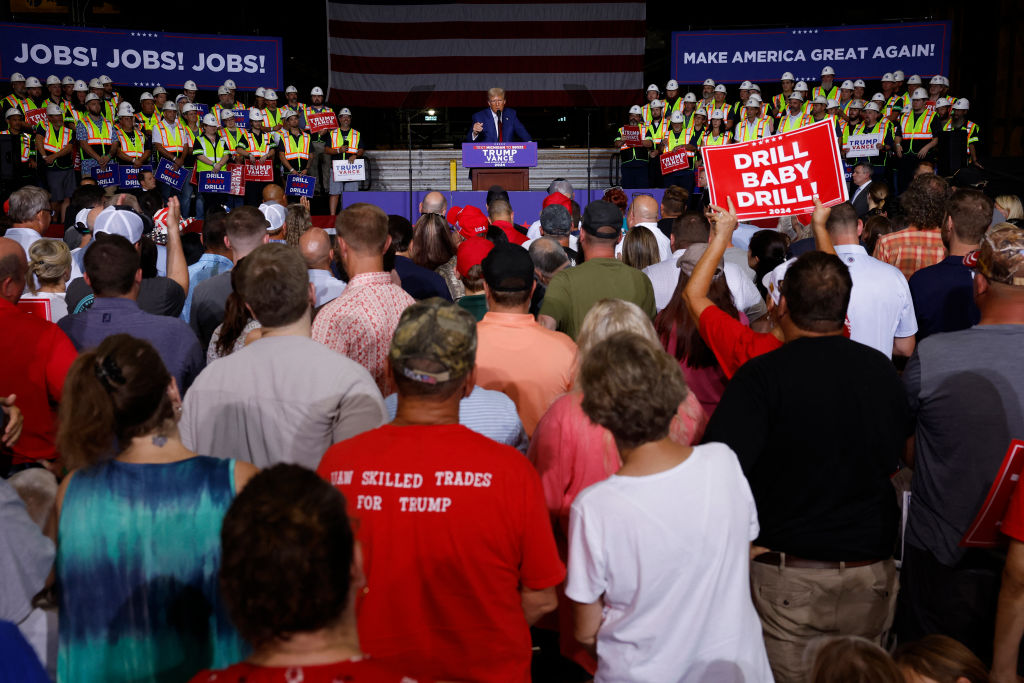Happy Thursday! We were yesterday years old when we discovered that the Mongolian government sets up a large ceremonial yurt—complete with elaborate furniture and a very plush-looking rug—inside the state palace when dignitaries come to town. No, really.
Quick Hits: Today’s Top Stories
- The Department of Justice on Wednesday indicted two Russian-state media employees, alleging the pair schemed to disseminate Russian government propaganda through an online media company headquartered in Tennessee. The indictment alleges the Moscow-based pair—who work for RT, formerly Russia Today, and were charged with violations of the Foreign Agents Registration Act and money laundering—funneled $10 million to the company, which the indictment does not name but is reportedly Tenet Media. The company supported a network of right-wing social media influencers—including Benny Johnson and Tim Pool, also not named in the indictment—who created social media content that advanced Russian talking points. Johnson and Pool maintain they were not complicit in the scheme, with Pool tweeting, “Should these allegations prove true, I as well as the other personalities and commentators were deceived and are victims.”
- Also on Wednesday, the Treasury Department sanctioned 10 Russian individuals—including the editor-in-chief of RT and other RT employees—and two entities for alleged efforts to influence the U.S. presidential election. The DOJ also seized 32 internet domains traced back to “Doppelganger,” a deception campaign directed by Russian President Vladimir Putin that allegedly uses artificial intelligence technology to spread intentionally false information and, more specifically, the DOJ alleged, to influence election results. “An internal planning document created by the Kremlin states that a goal of the campaign is to secure Russia’s preferred outcome in the election,” Attorney General Merrick Garland said in a statement. “The sites we are seizing today were filled with Russian government propaganda that had been created by the Kremlin to reduce international support for Ukraine, bolster pro-Russian policies and interests, and influence voters in the United States and other countries.”
- A 14-year-old shooter opened fire at a high school in Barrow County, Georgia, on Wednesday, killing four people—two students and two teachers—and injuring at least nine others, some of whom are in critical condition. Law enforcement officials said they detained the male student at the school after he surrendered shortly after opening fire in a school hallway. He will be charged as an adult for murder. Barrow County Sheriff Jud Smith said in a press conference that investigators have not yet identified the motive of the shooter, or determined if his attack was premeditated or specifically targeted the victims. The FBI’s Atlanta Field Office said in a statement on Wednesday it had interviewed the gunman last year related to anonymous tips about his online threats to attack a school.
- Ukrainian Foreign Minister Dmytro Kuleba submitted his resignation on Wednesday, the latest of several Ukrainian cabinet-level changes in recent days. On Tuesday, Ukraine’s ministers of justice, the environment, and strategic industries, two deputy prime ministers, and State Property Fund director all submitted their resignations—though Ukraine’s parliament on Wednesday refused to accept the resignations of the State Property Fund director and one deputy prime minister. While the motives for this cabinet reshuffle remain unclear, Ukrainian President Volodymyr Zelensky hinted at leadership changes on Tuesday. “We need a new level of simultaneous information work—cultural and diplomatic—and we need a new level of relations with the global Ukrainian community,” Zelensky said in a video message. “Now is the time to give new strength to Ukraine’s governmental institutions, and I am grateful to everyone who will help.”
- Meanwhile, Ukrainian authorities said on Wednesday that a Russian airstrike in the western Ukrainian city of Lviv killed seven people, including children, and left at least 30 others injured. Most of those killed were part of a single family—a mother and her three daughters, ages 21, 18, and 7 years old. According to Zelensky, Russia deployed drones and missiles, which struck civilian schools, medical centers, and residential buildings in the city only about 40 miles from the border with Poland, prompting Polish authorities to scramble fighter jets in the bordering region.
- A South Korean media network reported on Wednesday that North Korean dictator Kim Jong Un ordered the executions of 20 to 30 North Korean government officials late last month, reportedly blaming them for mass floods that wreaked havoc in northwestern parts of the country along its border with China and charging them with corruption and dereliction of duty. A state-owned North Korean media agency reported in late July that, in an emergency meeting to address the floods, Kim “proposed to strictly punish those who severely neglected their responsible duties … a practice that cannot be pardoned.”
- The Labor Department on Wednesday reported fewer job openings than economists had expected in July: There were 7.67 million available posts in the U.S. in July, 273,000 fewer open positions than in the month prior and the lowest reported figure since January 2021. Meanwhile, total job separations—which include quits, layoffs, discharges, and other separations—increased by 336,000 in July to 5.4 million in total, a monthly increase of 6.6 percent. The report—indicative of a cooling jobs market—is likely to further cement Federal Reserve officials’ decision to lower rates at their meeting later this month.
- Axios reported on Wednesday that senior U.S. and Israeli government officials met virtually on Wednesday to discuss de-escalation tactics in the Middle East in an effort to prevent an all-out war between Israel and the Iran-backed, Lebanese-based terrorist organization, Hezbollah. The hour-long meeting—led by U.S. National Security Adviser Jake Sullivan—included a discussion of strategies to lower the temperature both in the event of a Gaza ceasefire agreement and in the absence of one. Israel and Hezbollah had exchanged intense fire just over a week ago, while the U.S. has bolstered its military presence in the region in recent weeks.
‘We’re Not Weird’

In Pennsylvania last week, voters were greeted with a barrage of mailers suggesting former President Donald Trump was not a crusading conservative, but rather a sensitive moderate.
The mailers emphasized, in bold, that Trump “did not write and does not support Project 2025.” Instead, eliminating taxes on social security, letting each state decide its own abortion policy, and making tips exempt from taxes were part of his “real common sense agenda.”
The ads were paid for by the Republican Federal Committee of Pennsylvania, but the messaging encapsulates one of the central, if underrated, themes of the Trump campaign itself: the struggle between conservative policy wonks and a candidate whose instincts often pull in the other direction. Trump’s policy proposals often play second fiddle to his grievance-of-the-day or -week, making it difficult to judge in which direction a second Trump administration would actually go.
Project 2025 is a prime example. The program—launched by the Heritage Foundation think tank—was aimed at preparing for the next “conservative” Trump administration, and includes a list of policy proposals, called the Mandate for Leadership, envisioning a sweeping overhaul of the federal government. Kevin Roberts, the president of Heritage, told former Trump adviser Steve Bannon earlier this summer that the U.S. is “in the process of the second American Revolution, which will remain bloodless if the left allows it to be.”
Those revolutionary claims—and the Mandate’s very conservative policy proposals—quickly became the target of Democratic attacks, spurring Trump to disavow Project 2o25, claiming he “knew nothing” about the program. While Trump has close relationships with many key members of the project—former Cabinet secretaries Russell Vought, Ben Carson, and Christopher Miller all wrote chapters, and dozens of other former officials were involved in its creation—he seemed to view being tied to a laundry list of conservative priorities as damaging to his core appeal.
Indeed, to many of Trump’s voters, policy is secondary to his bomb-throwing tendencies and often bizarre statements. On Truth Social, his social media network, information about his positions often takes a back seat to screenshotted Facebook reports of crimes allegedly committed by Latino gangs, accompanied with quotes like, “Kamala has surrendered control of our neighborhoods to Migrant Gangs. I WILL LIBERATE THEM”; or images that show people from the Middle East burning American flags alongside the claim that they would be “your new neighbors if Kamala Harris wins.” Trump also regularly complains about the gag order imposed on him in relation to his criminal trial in New York, posts videos inveighing against his various indictments, and links to blog posts that show clearly artificial intelligence-generated images of Harris dressed like a mustachioed dictator.
And when Trump does talk about policy, it’s often in vague terms and with great and evident reluctance. On abortion, for example, one of the most important issues of this campaign, Trump has been notoriously evasive—and enormously frustrating to many of his pro-life supporters. On the overturning of Roe v. Wade, one of his presidency’s biggest accomplishments, he said, improbably, that “Every Democrat, every Republican, everybody wanted Roe v. Wade terminated and brought back to the states.”
But when it comes to abortion restrictions, Trump has been remarkably reluctant to take a stand. His campaign has said that he would veto any federal restriction on abortion, and he’s been notably reticent on state-level bans. When asked last week whether he, as a Florida resident, would vote for Florida’s pending Amendment 4, which would essentially enshrine a right to an abortion in the state constitution, Trump said, “I am going to be voting that we need more than six weeks.” But he later clarified that he opposes the measure that would protect almost all abortions in the state.
Trump’s campaign tried to walk back his statement on Florida’s proposed amendment after facing pushback from the pro-life right—the latest sign that ties between him and his erstwhile allies are fraying. Lila Rose, a high-profile pro-life activist, recently said that she no longer sees the former president as an ally.
But for all his inconsistencies, there are some continuities guiding Trump’s policy proposals, such as they are. Ever since he announced he was running for president in 2016—and even before his formal entry into politics—Trump has seemed committed to two lodestars: the belief that foreign countries are “ripping us off” in international trade, and the conviction that too many immigrants are coming to America.
On tariffs, the former president would likely be picking up where President Joe Biden left off with China. Protectionism, then, is in vogue—but Trump is promising to up the ante. He has proposed a 10 to 20 percent universal tariff on imported goods and tariffs of up to 60 percent on goods manufactured in China. But as we wrote yesterday, Scott Lincicome is concerned about the long-term effects of such levies on domestic industry.
Trump has also promised to crack down on illegal immigration and limit legal immigration. He proposed using the Immigration and Customs Enforcement agency, the National Guard, and local police forces to conduct mass deportations of illegal immigrants—a population that likely totals around 15 million people—in “the largest domestic deportation operation in American history.”
As with many Trump proposals, the exact details are unclear. The president has no inherent authority to mobilize state and local police forces, and the military cannot legally be used for civil law enforcement operations—although this restriction does not apply to the National Guard.
In a podcast interview, Trump adviser Stephen Miller—who is considered the mastermind of Trump’s immigration agenda during his first term and was recently brought back onto the campaign’s staff—told Charlie Kirk, a right-wing activist, that the plan would require the construction of “large-scale staging grounds near the border.” Miller echoed Trump’s determination: “I want everybody to understand this is going to happen,” he said last year. “If President Trump is back in the Oval Office in January, this is going to commence immediately.”
Cutting immigration has long been a priority for parts of the right, and free trade is now viewed with suspicion by large portions of the GOP, but Trump has also proposed policies in this campaign that came as a surprise to many conservatives.
At a June rally in Nevada, Trump announced that he wanted to exempt tips from taxes, a policy that he seems to have come up with while speaking to a waitress at one of his restaurants. It caught on: Vice President Kamala Harris swiftly announced that she also wanted to eliminate taxes on tips. The policy has been widely critiqued by economists, who argue that it unfairly favors tipped workers—but it is nevertheless popular with voters. Almost 75 percent of voters support the proposal, with almost no difference between Republicans and Democrats, according to Ipsos.
While Trump’s no-tax-on-tips policy proposal is the electoral equivalent of a layup, he’s also waded into controversy. Weighing in on the ongoing debate over access to in-vitro fertilization, he announced last week he supported either the government or insurance providers paying for the expensive fertility treatment. The proposal seemed to come, as many Trump ideas do, out of left field—and previously would have found few advocates in the Republican Party.
As uninterested as Trump has seemed in the details of domestic policy, he’s been even vaguer on foreign policy. On the wars in the Middle East and Ukraine, he’s proposed lofty promises to reach settlements that will satisfy all sides. He’s flip-flopped on support for Ukraine—and his running mate, Sen. J.D. Vance, has been one of the most vocal critics of continued U.S. aid to the wartorn country.
But Trump has previously said that he could end the conflict between Russia and Ukraine “in 24 hours.” While Trump has not endorsed a specific framework for peace talks, two of his top foreign policy advisers—Keith Kellogg and Fred Fleitz—presented him with a plan in June that proposed bringing Ukraine to the negotiating table by threatening to cut off American aid, and forcing Russia into talks by threatening to increase it. It is not quite clear where Trump stands on the plan, although Fleitz claimed the reception was positive.
It seems that Trump’s views on foreign policy rest in large part on what he sees as his own charisma. On a recent episode of the Dispatch Podcast, retired Gen. H.R. McMaster—who served as Trump’s national security adviser—said that Trump’s obvious personal affinity for authoritarian leaders, like Russian President Vladimir Putin, stemmed from “his belief that he can get a big deal” by using his powers of negotiation.
Trump has had even less to say on perhaps the dominant foreign policy issue of the day: Israel’s war against Hamas in Gaza. He has, however, claimed that “THE OCTOBER 7th ISRAELI CRISIS WOULD NEVER HAVE HAPPENED IF I WERE PRESIDENT!” on Truth Social. His previous administration was perhaps one of the most pro-Israel in recent memory, brokering the Abraham Accords—Israel’s normalization of relations with several Arab states—and moving the American embassy to the country’s capital of Jerusalem. Trump has bragged that he “fought for Israel like no president ever before.”
But the former president has also made ambivalent public statements about the war’s toll on Israel’s global image. “They’re losing the PR war,” he said in April, discussing the images of devastation in Gaza. “They’re losing it big. But they’ve got to finish what they started, and they’ve got to finish it fast, and we have to get on with life.”
It’s worth noting that a number of national security personnel who served during Trump’s first term have publicly broken with the former president: Former Defense Secretary Mark Esper, former National Security Adviser John Bolton, former White House Chief of Staff John Kelly, and former Secretary of Defense Jim Mattis, among others, have all said either that they will not vote for Trump or criticized him in very strong terms.
Even still, the former president seems to have a slight edge over Harris on some of the most important issues of the day—the economy, immigration, and foreign policy, not that Trump likes to talk much about them.
Trump must decide on operating “from a position of strength, which is the policy side,” as David Winston, a pollster and political consultant, told TMD, “or from weakness, which is the favorability/unfavorability side.”
On Wednesday night, in a town hall with Fox News host Sean Hannity, Trump may have given an indication of which way he’s leaning:
“J.D.is not weird,” he told Hannity of Democrats’ common attack on him and his running mate. “He’s a solid rock. I happen to be a very solid rock. We’re not weird. We’re other things, perhaps, but we’re not weird.”
Worth Your Time
- Hersh Goldberg-Polin, a 23-year-old Israeli-American, was among the six hostages murdered in Gaza by Hamas last week. Writing in National Review, Michael M. Rosen reflected on what Hersh’s life as an American in Israel had meant to him. “The Goldberg-Polins had made the move—they had ‘made aliyah,’ or ascended, to the Holy Land—several years earlier, when Hersh and his sisters were roughly the ages of our kids, and they had adjusted remarkably well to a new culture, language, and climate,” he wrote. “These impressions would later be reinforced by other experiences with Hersh and family, whether dancing raucously at bat mitzvah parties or sharing the exhilaration of a Hapoel Jerusalem basketball game, where Hersh enthusiastically joined the boisterous section of superfans who chanted and jumped around throughout the match. He made friends across the Jewish-Arab divide and in numerous cultures and countries through soccer and basketball networks; he sought coexistence in his own charismatic way. He was proof positive that you could love Israel fiercely and also love peace.”
- For the GOP, might the ingredient for long-term success be its defeat in the 2024 election? “The best possible outcome in November for the future of the Republican Party is for former President Donald Trump to lose and lose soundly,” Jonathan Martin wrote for Politico. “Trump will never concede defeat, no matter how thorough his loss. Yet the more decisively Vice President Kamala Harris wins the popular vote and electoral college the less political oxygen he’ll have to reprise his 2020 antics; and, importantly, the faster Republicans can begin building a post-Trump party,” Martin continued. “For most Republicans who’ve not converted to the Church of MAGA, this scenario is barely even provocative. In fact, asking around with Republicans last week, the most fervent private debate I came across in the party was how best to accelerate Trump’s exit to the 19th Hole. … Yes, moving past Trump in the aftermath of another defeat will hardly be easy. But it’s essential if Republicans want to become a viable national party once more.”
Presented Without Comment
CNN: Liz Cheney Says She Is Voting For Harris For President
“As a conservative, as someone who believes in and cares about the Constitution, I have thought deeply about this, and because of the danger that Donald Trump poses, not only am I not voting for Donald Trump, but I will be voting for Kamala Harris,” the former Wyoming congresswoman said Wednesday.
Also Presented Without Comment
New York Post: Embattled Georgia DA Fani Willis Showed Up to Site of Daughter’s Arrest With Prosecutor Lover Long After Pair Claimed Affair Ended, Bodycam Footage Shows
Also Also Presented Without Comment
NBC News: Christmas in October? Venezuela’s Leader Moves Holiday to Boost Support After Disputed Election
In the Zeitgeist
Only weeks after winning the gold in women’s soccer at the 2024 Paris Olympic games as a breakout rookie star, Washington Spirit midfielder Croix Bethune suffered a season-ending injury, sustained as she was throwing a ball. But not a soccer ball—a baseball.
Apparently, Bethune tore her meniscus while throwing an otherwise very normal-looking—if high and outside—ceremonial first pitch during a Washington Nationals game last week.

Toeing the Company Line
- In the newsletters: The Dispatch Politics crew covered Turning Point Action’s attempts to boost the Trump campaign’s ground game and Nick argued that Tucker Carlson is taking advantage of the right’s leadership vacuum.
- On the podcasts: On the latest episode of The Remnant, a road-tripping Jonah answers listener questions about the business side of The Dispatch, his intellectual journey, and van life. On Advisory Opinions, Sarah and David engage in some fantasy football trash talk before turning to free speech, social media algorithms, and Section 230.
- On the site: Tommy Sheppard marks the 250th anniversary of the First Continental Congress, and Valerie Wirtschafter explains the real threats artificial intelligence poses to the election.
Let Us Know
How much of the agenda outlined above do you believe Donald Trump would pursue in a second term if he is elected in November?












Please note that we at The Dispatch hold ourselves, our work, and our commenters to a higher standard than other places on the internet. We welcome comments that foster genuine debate or discussion—including comments critical of us or our work—but responses that include ad hominem attacks on fellow Dispatch members or are intended to stoke fear and anger may be moderated.
With your membership, you only have the ability to comment on The Morning Dispatch articles. Consider upgrading to join the conversation everywhere.